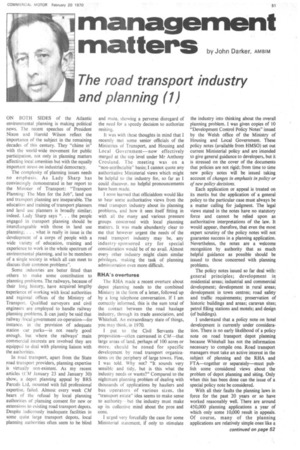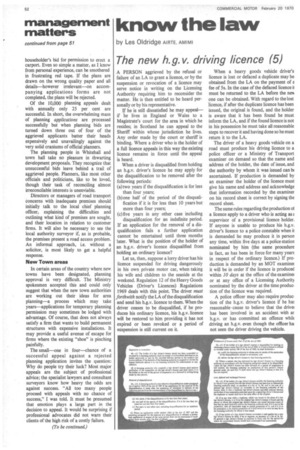management
Page 53

Page 54

If you've noticed an error in this article please click here to report it so we can fix it.
matters by John Darker, AMBIM
The road transport industry and planning (1)
ON BOTH SIDES of the Atlantic environmental planning is making political news. The recent speeches of President Nixon and Harold Wilson reflect the importance of the subject in the remaining decades of this century. They "chime in" with the world-wide movement for public participation, not only in planning matters affecting local amenities but with the equally important stress on industrial democracy.
The complexity of planning issues needs no emphasis. As Lady Sharp has convincingly demonstrated in her report to the Minister of Transport: "Transport Planning: The Men for the Job", land use and transport planning are inseparable. The education and training of transport planners and land use planners is broadly similar; indeed. Lady Sharp says ". . . the people engaged in transport planning should be interchangeable with those in land use planning; . . . what is really in issue is the development of a corps of people with a wide variety of education, training and experience to work in the whole spectrum of environmental planning, and to be members of a single society in which all can meet to discuss their common problems".
Some industries are better fitted than others to make some contribution to planning problems. The railways, because of their long history, have acquired lengthy experience of working with local authorities and regional offices of the Ministry of Transport. Qualified surveyors and civil engineers are employed to handle railway planning problems. It can justly be said that railway /local government co-operation—for instance, in the provision of adequate station car parks—is not nearly good enough, but where the railways' main commercial interests are involved they are equipped to deal with planning liaison with the authorities.
In road transport, apart from the State road transport providers, planning expertise is virtually non-existent. As my recent articles (CM January 23 and January 30) show, a depot planning appeal by BRS Parcels Ltd, mounted with full professional expertise, failed. Almost every week CM hears of the refusal by local planning authorities of planning consent for new or extensions to existing road transport depots. Despite ludicrously inadequate facilities in some quite large transport depots, local planning authorities often seem to be blind
and mute, showing a perverse disregard of the need for a speedy decision to authorize resiting.
It was with these thoughts in mind that I recently met some senior officials of the Ministries of Transport, and Housing and Local Government—now effectively merged at the top level under Mr Anthony Crosland. The meeting was on a "non-attributable" basis; I cannot quote any authoritative Ministerial views which might be helpful to the industry for, so far as I could discover, no helpful pronouncements have been made.
I soon learned that officialdom would like to hear some authoritative views from the road transport industry about its planning problems, and how it sees itself fitting in with all the many and various pressure groups concerned with local planning matters. It was made abundantly clear to me that however urgent the needs of the road transport industry may be, any industry-sponsored cry for special consideration would be of no avail. Almost every other industry might claim similar privileges, making the task of planning administration even more difficult.
RHA's overtures The RI-IA made a recent overture about depot planning needs to the combined Ministry in the form of a letter, followed up by a long telephone conversation. If I am correctly informed, this is the sum total of the contact between the road haulage industry, through its trade association, and Whitehall. An extraordinary state of things, you may think, in 1970.
I put to the Civil Servants the proposition—often canvassed in CM—that large areas of land, perhaps of 100 acres or more, should be zoned for specific development by road transport organizations on the periphery of large towns. Fine, I was told. Why not? "It sounds very sensible and tidy, but is this what the industry needs or wants?" Compared to the nightmare planning problem of dealing with thousands of applications by hauliers and bus operators of various sizes, the "transport estate" idea seems to make sense to authority— hut the industry must make up its collective mind about the pros and cons.
I urged very forcefully the case for some Ministerial statement, if only to stimulate the industry into thinking about the overall planning problem. I was given copies of 10 "Development Control Policy Notes" issued by the Welsh office of the Ministry of Housing and Local Government. These policy notes (available from HMSO) set out current Ministerial policy and are intended to give general guidance to developers, but it is stressed on the cover of the documents that policies are not rigid; from time to time new policy notes will be issued taking account of changes in emphasis in policy' or of new policy decisions.
Each application or appeal is treated on its merits but the application of a general policy to the particular case must always be a matter calling for judgment. The legal views stated in the notes have no statutory force and cannot be relied upon as authoritative interpretations of the law. It would appear, therefore, that even the most expert scrutiny of the policy notes will not guarantee success in a planning application. Nevertheless, the notes are a welcome recognition by authority that as much helpful guidance as possible should be issued to those concerned with planning problems.
The policy notes issued so far deal with: general principles; development in residential areas; industrial and commercial development; development in rural areas; development in town centres; road safety and traffic requirements; preservation of historic buildings and areas; caravan sites; petrol filling stations and motels; and design (of buildings).
I understand that a policy note on hotel development is currently under consideration. There is no early likelihood of a policy note on road transport depot planning because Whitehall has not the information necessary to compile one. Road transport managers must take an active interest in the subject of planning and the RHA and FTA—together or separately—must publish some considered views about the problem of depot planning and siting. Only when this has been done can the issue of a special policy note be considered.
With all their faults the planning laws in force for the past 20 years or so have worked reasonably well. There are around 450,000 planning applications a year of which only some 10,000 result in appeals. Of course, many of the planning applications are relatively simple ones like n
householder's bid for permission to erect a carport. Even so simple a matter, as I know from personal experience, can be smothered in frustrating red tape. If the plans are drawn on the wrong quality paper and all details—however irrelevant—on accompanying applications forms are not completed, the plans will be rejected.
Of the 10,000 planning appeals dealt with annually only 25 per cent are successful. In short, the overwhelming mass of planning applications are processed successfully but when planning bids are turned down three out of four of the aggrieved applicants batter their heads expensively and unavailingly against the very solid craniums of official planners.
The planning people in Whitehall and town hall take no pleasure in thwarting development proposals. They recognize that unsuccessful bids leave behind a trail of aggrieved people. Planners, like most other officials and politicians, like to be loved, though their task of reconciling almost irreconcilable interests is unenviable.
Directors or managers of road transport concerns with inadequate premises should initially talk to the local chief planning officer, explaining the difficulties and outlining what kind of premises are sought, and their location in relation to customer firms. It will also be necessary to see the local authority surveyor if, as is probable, the premises present a road access problem. An informal approach, i.e. without a solicitor, is most likely to get a helpful response.
New Town areas In certain areas of the country where new towns have been designated, planning approval is very difficult. The Ministry spokesmen accepted this and could only suggest that when the new town authorities are working out their ideas for area planning—a process which may take years—applications for temporary planning permission may sometimes be lodged with advantage. Of course, that does not always satisfy a firm that wants to build permanent structures with expensive installations. It may provide a useful avenue of escape for firms where the existing "shoe" is pinching painfully.
The small—one in four—chance of a successful appeal against a rejected planning application invites the question: Why do people try their luck? Most major appeals are the subject of professional advice; the specialist lawyers and consultant surveyors know how heavy the odds are against success. "All too many people proceed with appeals with no chance of success," I was told. It must be presumed that emotion plays a large part in the decision to appeal. It would be surprising if professional advocates did not warn their clients of the high risk of a costly failure.














































































































































































































